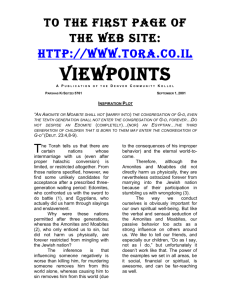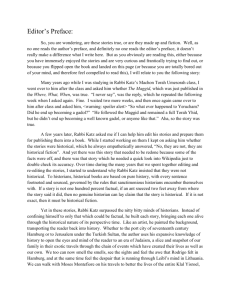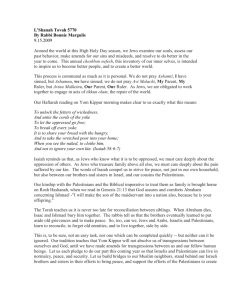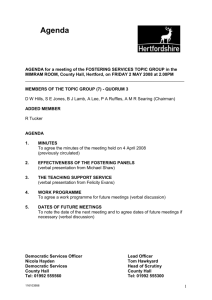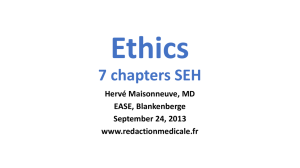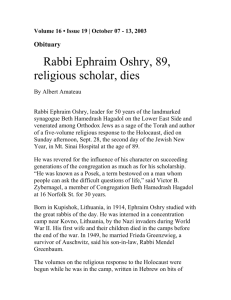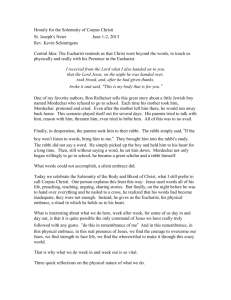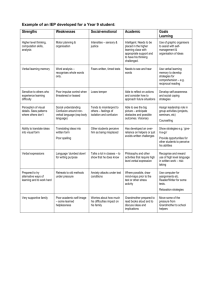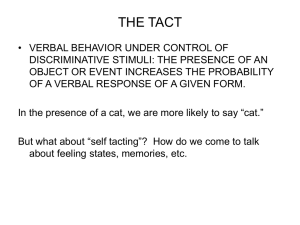Doing Wrong with Words
advertisement
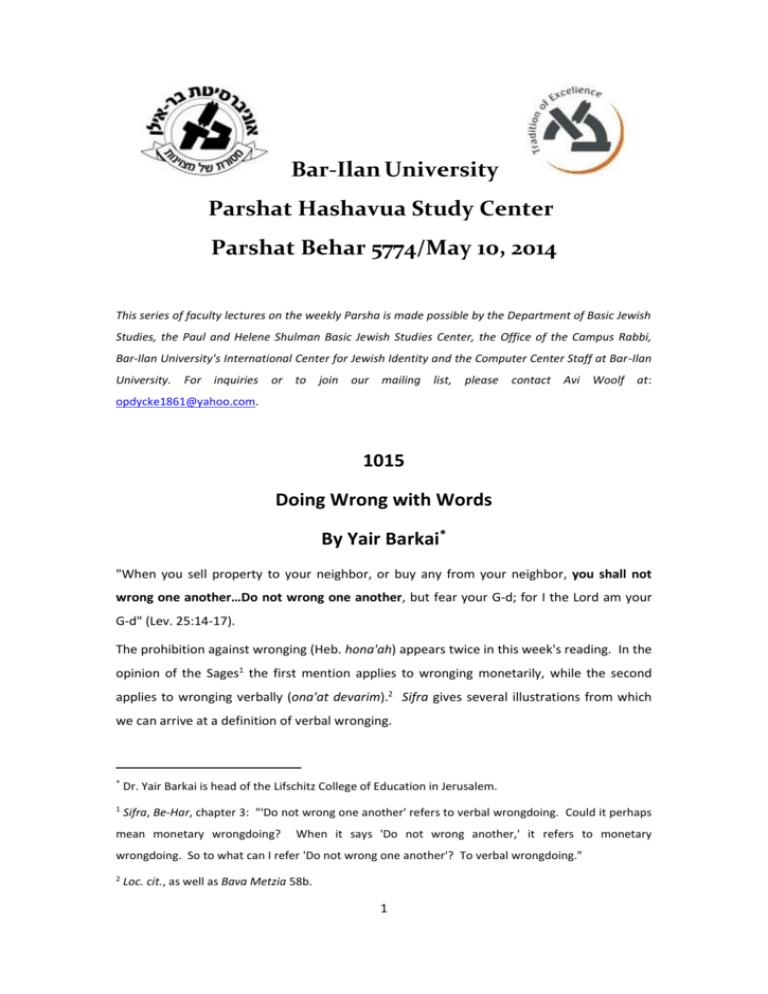
Bar-Ilan University Parshat Hashavua Study Center Parshat Behar 5774/May 10, 2014 This series of faculty lectures on the weekly Parsha is made possible by the Department of Basic Jewish Studies, the Paul and Helene Shulman Basic Jewish Studies Center, the Office of the Campus Rabbi, Bar-Ilan University's International Center for Jewish Identity and the Computer Center Staff at Bar-Ilan University. For inquiries or to join our mailing list, please contact Avi Woolf at: opdycke1861@yahoo.com. 1015 Doing Wrong with Words By Yair Barkai* "When you sell property to your neighbor, or buy any from your neighbor, you shall not wrong one another…Do not wrong one another, but fear your G-d; for I the Lord am your G-d" (Lev. 25:14-17). The prohibition against wronging (Heb. hona'ah) appears twice in this week's reading. In the opinion of the Sages1 the first mention applies to wronging monetarily, while the second applies to wronging verbally (ona'at devarim).2 Sifra gives several illustrations from which we can arrive at a definition of verbal wronging. * Dr. Yair Barkai is head of the Lifschitz College of Education in Jerusalem. 1 Sifra, Be-Har, chapter 3: "'Do not wrong one another' refers to verbal wrongdoing. Could it perhaps mean monetary wrongdoing? When it says 'Do not wrong another,' it refers to monetary wrongdoing. So to what can I refer 'Do not wrong one another'? To verbal wrongdoing." 2 Loc. cit., as well as Bava Metzia 58b. 1 How so? To a person who has returned to the religion, one should not say: Remember how you used to act. To the child of proselytes, one should not say: Remember how your parents used to be. If misfortunes came to him and he had to bury his children, one should not be like Job's friends, who said to him: "Is not your piety your confidence, your integrity your hope? Think now, what innocent man ever perished? Where have the upright been destroyed?" (Job 4:6). If a person were to see donkey-drivers seeking grain and wine, one should not say to them: Go to so-and-so, when that person has never sold wheat in his life. Rabbi Judah says: One should not even look to strike a good bargain, nor should one say to another how much a certain object costs when the person has no interest in buying it; and should you say, "But I give him good advice," be aware that this is a matter of the heart, for it is said in this regard: "You shall fear your G-d," and with respect to everything that is a matter of the heart, it says: "you shall fear." A look at the examples in this source gives cause for wonder, since in most of them one cannot easily identify a motive of trying to cheat someone. From these illustrations we may conclude that wronging verbally is not necessarily tied to deceiving, as in defrauding someone of money; rather, it relates to doing someone wrong, causing sadness, angering, or insulting another by mocking the person or showing a lack of sensitivity.3 Examining other sources in Scripture, we come to a similar conclusion. When the prophet Ezekiel (18:7) describes a righteous father, among his admirable qualities he notes: "if he has not wronged anyone; if he has returned the debtor's pledge to him and has taken nothing by robbery; if he has given bread to the hungry and clothed the naked." Whereas, a wicked son (Ezek. 18:12) "has wronged the poor and the needy, has taken by robbery, has not returned a pledge, has raised his eyes to the fetishes, has committed abomination." Wronging holds a central place in the prophet's definition of the righteous and the wicked. Since he mentions robbery and debtor's pledges, both of which concern monetary matters, aside from mentioning wronging, we may presume that by the term "wronging" he meant verbal wronging. 3 Defined thus in the Gur and Even-Shoshan dictionaries, as well as in the Encyclopedia Talmudit, under hona'at devarim. Also see the article by Avraham Ahuvya: "Ma hi Hona'ah?" Bet Mikra 52, Sept.-Nov. (Tishre-Kislev) 1973. 2 Similarly in Jeremiah (22:3): "Thus said the Lord: Do what is just and right; rescue from the defrauder him who is robbed, do not wrong the stranger, the fatherless, and the widow; commit no lawless act and do not shed the blood of the innocent in this place." Rashi comments on this verse: "Do not wrong—meaning to wrong verbally." The Mekhilta's comment on the verse, "You shall not wrong a stranger or oppress him, for you were strangers in the land of Egypt" (Ex. 22:20) also leads to a similar conclusion (Mekhilta de Rabbi Ishmael, Mishpatim, Tractate De-Nezikin, chapter 18, s.v. "ve-ger lo toneh"): You shall not wrong him—in words, or oppress him—in money matters. You shall not say to him: Just yesterday you were worshipping Bel, Kores and Nevo,4 and swine's flesh was sticking out from between your teeth; and now you dare stand up and speak against me!5 What element of cheating is there in reminding of his past a proselyte, who used to worship other gods and eat pork? Rather, when such things are said to a proselyte they express lack of sensitivity and are bluntly mocking, and that is precisely what is meant by verbal wronging. The Torah and the Prophets mention the principal victims of wronging verbally: the weaker element in society—the stranger, the poor, the fatherless, and the widow—for Scripture spoke in terms of common experience at the time. Society, as we know, is judged by its treatment of the weakest link in the people, those who must receive help and support in order to survive. The Sages showed great sensitivity in mentioning another group likely to become victims of verbal wronging: women, in the words of the Talmud (Bava Metzia 59a): "Rav said: One should always be heedful of wronging his wife, for since her tears are frequent she is quickly hurt." Rav notes the power of a woman's tears, for at times this is the only thing left her to express her sorrow and suffering. Indeed, the gemara follows Rav's remarks with these words of Rabbi Eleazar: 4 Bel and Nevo are names of famous Babylonian deities. The expression, "Bel, Kores, Nevo," comes from Isaiah 46:2. 5 Mekhilta de-Rabbi Ishmael, Mishpatim, Tractate de-Nezikin, chapter 18, s.v. "ve-ger lo toneh." 3 Rabbi Eleazar said: Since the destruction of the Temple, the gates of prayer are locked, for it is written, "And when I cry and plead, He shuts out my prayer" (Lament. 3:8). Yet though the gates of prayer are locked, the gates of tears are not, for it is written, "Hear my prayer, O Lord; give ear to my cry; do not disregard my tears" (Ps. 39:13). Such is the power of tears, speedily bringing retribution to the person who causes tears to flow from a woman's eyes. Perhaps even the familiar story about Rav Rehumi (Ketubot 62b) can be used to illustrate our point: Rabbi Rehumi studied under Raba at Mahuza and used to return home on the eve of every Day of Atonement. On one occasion he became engrossed in his subject, and [meanwhile] his wife was expecting him, saying, "He is coming soon, he is coming soon," but he did not show up. She became so depressed that tears began to flow from her eyes. He was [at that moment] sitting on a roof. The roof collapsed under him and he was killed.6 Ostensibly, "the study of Torah is equal to all [the commandments]" (Mishnah, Pe'ah 1.1), and therefore one might have thought that even a regular visit home on the eve of the Day of Atonement could be put aside for this sublime purpose; however the narrator presents Rabbi Rehumi as having erred in preferring his studies over his expected return home to his wife, since his regular custom had been to return home every eve of the Day of Atonement, a common practice among all the students, who due to the extreme sanctity of the day took care to spend it in the midst of their families. Deviating from his accepted practice without informing his wife can be seen as wronging verbally. This was quite a daring story to have been told in the Bet Midrash for the edification of the student body there. We see from the examples given above that the prohibition against verbal wronging concerns almost every walk of life. Whence the great severity of this proscription? The Sages give the following justification of its severity (Bava Metzia, 58b): Rabbi Johanan said in the name of Rabbi Simeon ben Yohai: Verbal wrong is more heinous than monetary wrong; regarding the former, it is written, "fear your G-d" (Lev. 25:36), but not of the latter. Rabbi Eleazar said: The 6 Hebrew text of story from Jonah Frankl, Iyyunim be-`Olamo ha-Ruhani shel Sippur ha-Aggadah, Tel Aviv 1981, pp. 100-101. Also see the literary analysis there. 4 one affects [the victim's] very being, the other [only] his money. Rabbi Samuel b. Nahmani said: For the former restoration is possible, but not for the latter. Three arguments are made here: 1. That a person who transgresses this prohibition has no fear of G-d. 2. That when a person is wronged monetarily, he suffers only in terms of his possessions, but when wronged verbally, the victim suffers in his person, and this is far more serious. 3. Restoration can be made for monetary damage, but not for injury to a person's being; hence verbal wrongdoing is not readily atoned. Translated by Rachel Rowen 5

